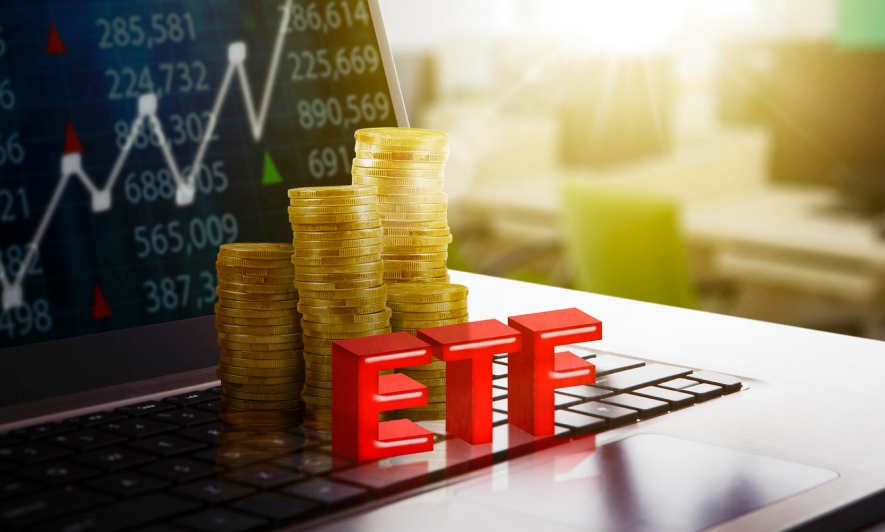Bank ETFs (Exchange-Traded Funds) – Definition, Working, Pros & Cons, And More
by Soumava Goswami Loans & Credit 03 January 2024

Bank ETFs (exchange-traded funds) are a type of investment fund that offers the advantage of diversification as well as ease of trading. Like mutual funds, ETFs offer you the benefits of diversification. Also, like stocks, it offers you the ease of trading. With the help of these ETFs, you will be able to invest in a lot of securities at once. Furthermore, the fees of ETFs are comparatively lower than other types of funds.
In this article, you will learn what is a bank ETF and how it works in general. Apart from that, we will also discuss the various types of ETFs that are commonly available. In addition to that, we will share with you some of the major pros and cons of ETFs. Finally, you will learn how to choose the best ETF to invest in. Hence, to learn more, read on to the end of the article.
What Are Bank ETFs (Exchange-Traded Funds)?
Bank ETFs are Exchange-traded funds that focus mainly on the banking sector.
According to Investopedia,
“An exchange-traded fund (ETF) is a type of pooled investment security that operates much like a mutual fund. Typically, ETFs will track a particular index, sector, commodity, or other assets, but unlike mutual funds, ETFs can be purchased or sold on a stock exchange the same way that a regular stock can. An ETF can be structured to track anything from the price of an individual commodity to a large and diverse collection of securities.”
Apart from securities and individual commodities, you can also structure an ETF to track specific strategies of investment. Basically, an ETF consists of a collection of securities that one can trade on an exchange as well (just like company stocks). The types of investments that an ETF contains include – stocks, commodities, bonds, holdings, etc.
Also, with an ETF, the ratio of your expense shall be low. Furthermore, you will not have to deal with a lot of commissions for brokers, which is generally the case with individual stocks.
Read More: 10 Rare Dollar Bills To Look Out For: They Might Be In Circulation!
How Do Bank ETFs Work?
As the name suggests, Bank ETFs, like every other ETF, trade directly on the exchange. These products are based on indices. Hence, they do not need active management from time to time. With the help of an ETF, you can track the index of an asset as closely as possible. This will help you to generate returns akin to the basket. Also, an ETF’s trading price depends on the net asset value (NAV) of the representative underlying asset.
According to the Forbes Advisor,
“ETFs provide exposure to a basket of securities or commodities (gold/silver), or bonds traded on an exchange like a stock and traded in the form of units. While the basic character is the same as that of a mutual fund scheme that replicates the performance of the index, ETFs also have some features of an equity share.”
As an investor, you will get the opportunity to invest in a fund that looks like a basket of securities and works in the same manner. Also, you can buy or sell the units of an ETF directly in an exchange. Furthermore, you can determine the price with the help of a willing buyer or seller, just like it happens with an equity share.
Hence, an ETF’s price will keep on changing even during trading hours. Here, this change happens with the change in the price of underlying securities.
What Are The Pros And Cons Of Bank ETFs?
The following are the major pros and cons of Bank ETFs that you need to know:
Pros Of Bank ETFs
Here are some of the essential pros of bank ETFs that you will benefit from:
- You will have access to many stocks across the baking industry.
- The expense ratios are low, and you will also not have to deal with a lot of commissions for brokers.
- The diversification aspect can allow you to manage risks.
- You can focus on targeted industries with the help of ETFs.
Cons Of Bank ETFs
Here are a few cons of bank ETFs that you need to be aware of:
- You might have to pay higher fees if you manage ETFs actively.
- There is limited diversification of single-industry-focused ETFs.
- There is a lack of liquidity with ETFs. Hence, these can hinder transactions.
How To Choose An ETF?
According to NerdWallet,
“When researching ETFs, you’ll also need to consider the fund’s expense ratio, or the fee the fund charges to manage and maintain it. Because most ETFs are passively managed, ETF expense ratios are typically pretty low compared with other types of funds. For all their simplicity, exchange traded funds have nuances that are important to understand.”
In general, the cost of an ETF is low. However, the price can vary a lot depending on the fund you are choosing. Apart from that, the price also depends on the issuer of the fund, as well as the complexity and demand of the ETF.
Mostly, investors passively manage ETFs by tracking an index. On the other hand, actively managed ETFs look like mutual funds. However, they come with higher fees. Hence, you will need to consider your style of investment before you buy.
Furthermore, check the trading volume of an ETF over a particular period of time. This will allow you to compare the popularity of different funds. If an ETF has a higher trading volume, it will be easier to trade in that fund.
Read More: How To Become A Public Relations Specialist? – Steps To Follow
Wrapping Up
Hope this article was helpful for you in getting to know about bank ETFs. In such ETFs, you will get a variety of securities, commodities, and holdings that are related to the banking sector. However, before you choose a bank ETF, make sure you check the volume and price of the investment.
Do you have further suggestions on how to choose bank ETFs? Please share your ideas and opinions with us in the comments section below.
Read More:







































































































